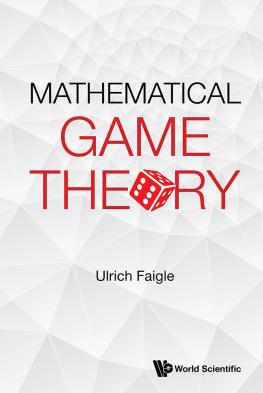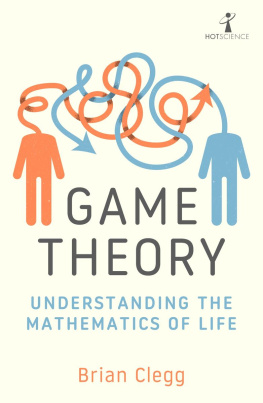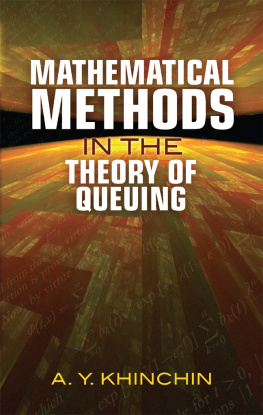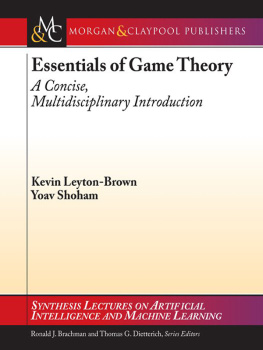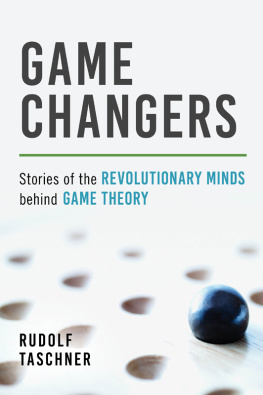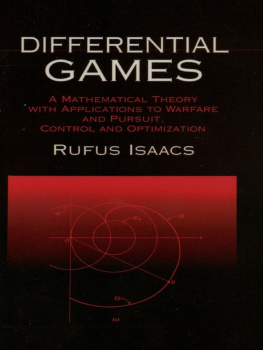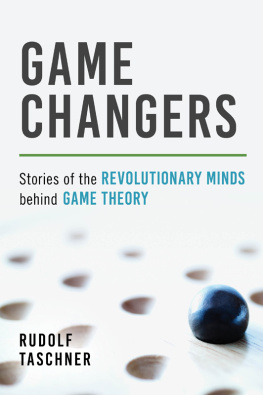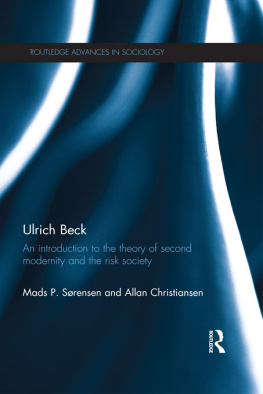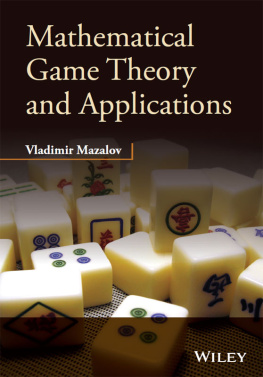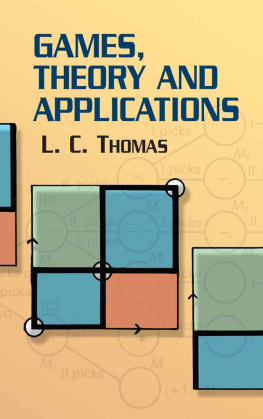Ulrich Faigle - Mathematical Game Theory
Here you can read online Ulrich Faigle - Mathematical Game Theory full text of the book (entire story) in english for free. Download pdf and epub, get meaning, cover and reviews about this ebook. year: 2022, publisher: World Scientific, genre: Home and family. Description of the work, (preface) as well as reviews are available. Best literature library LitArk.com created for fans of good reading and offers a wide selection of genres:
Romance novel
Science fiction
Adventure
Detective
Science
History
Home and family
Prose
Art
Politics
Computer
Non-fiction
Religion
Business
Children
Humor
Choose a favorite category and find really read worthwhile books. Enjoy immersion in the world of imagination, feel the emotions of the characters or learn something new for yourself, make an fascinating discovery.
- Book:Mathematical Game Theory
- Author:
- Publisher:World Scientific
- Genre:
- Year:2022
- Rating:3 / 5
- Favourites:Add to favourites
- Your mark:
- 60
- 1
- 2
- 3
- 4
- 5
Mathematical Game Theory: summary, description and annotation
We offer to read an annotation, description, summary or preface (depends on what the author of the book "Mathematical Game Theory" wrote himself). If you haven't found the necessary information about the book — write in the comments, we will try to find it.
Mathematical Game Theory — read online for free the complete book (whole text) full work
Below is the text of the book, divided by pages. System saving the place of the last page read, allows you to conveniently read the book "Mathematical Game Theory" online for free, without having to search again every time where you left off. Put a bookmark, and you can go to the page where you finished reading at any time.
Font size:
Interval:
Bookmark:

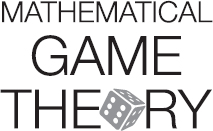
 Ulrich Faigle University of Cologne, Germany
Ulrich Faigle University of Cologne, Germany  Published by World Scientific Publishing Co. Pte. Ltd. 5 Toh Tuck Link, Singapore 596224 USA office: 27 Warren Street, Suite 401-402, Hackensack, NJ 07601 UK office: 57 Shelton Street, Covent Garden, London WC2H 9HE Library of Congress Cataloging-in-Publication Data Names: Faigle, Ulrich, author. Title: Mathematical game theory / Ulrich Faigle, University of Cologne, Germany. Description: New Jersey : World Scientific, [2022] | Includes bibliographical references and index.
Published by World Scientific Publishing Co. Pte. Ltd. 5 Toh Tuck Link, Singapore 596224 USA office: 27 Warren Street, Suite 401-402, Hackensack, NJ 07601 UK office: 57 Shelton Street, Covent Garden, London WC2H 9HE Library of Congress Cataloging-in-Publication Data Names: Faigle, Ulrich, author. Title: Mathematical game theory / Ulrich Faigle, University of Cologne, Germany. Description: New Jersey : World Scientific, [2022] | Includes bibliographical references and index.
Identifiers: LCCN 2021058963 | ISBN 9789811246692 (hardcover) | ISBN 9789811246708 (ebook) | ISBN 9789811246715 (ebook other) Subjects: LCSH: Game theory. Classification: LCC QA269 .F35 2022 | DDC 519.3--dc23/eng/20220125 LC record available at https://lccn.loc.gov/2021058963 British Library Cataloguing-in-Publication Data A catalogue record for this book is available from the British Library. Copyright 2022 by World Scientific Publishing Co. Pte. Ltd. All rights reserved.
This book, or parts thereof, may not be reproduced in any form or by any means, electronic or mechanical, including photocopying, recording or any information storage and retrieval system now known or to be invented, without written permission from the publisher. For photocopying of material in this volume, please pay a copying fee through the Copyright Clearance Center, Inc., 222 Rosewood Drive, Danvers, MA 01923, USA. In this case permission to photocopy is not required from the publisher. For any available supplementary material, please visit https://www.worldscientific.com/worldscibooks/10.1142/12540#t=suppl Desk Editor: Liu Yumeng Typeset by Stallion Press Email: Printed in Singapore Contents Preface People have gambled and played games for thousands of years. Yet, only in the 17th century we see a serious attempt for a scientific approach to the subject. The combinatorial foundations of probability theory were developed by various mathematicians such as J. BERNOULLI] as a means to understand games of chance (mostly involving rolls of dice) and to make conjectures according to mathematical principles.
Since then, game theory has grown into a wide field and appears at times quite removed from its combinatorial roots. The notion of a game has been broadened to encompass all kinds of human behavior and interactions of individuals or of groups and societies (see, e.g., BERNE []). Much of current research studies humans in economic and social contexts and seeks to discover behavioral laws in analogy to physical laws. The role of mathematics in this endeavor, however, has been quite limited so far. One major reason lies certainly in the fact that players in real life often behave differently than a simple mathematical model would predict. So seemingly paradoxical situations exist where people appear to contradict the straightforward analysis of the mathematical model builder.
A famous such example is the chain store paradox of SELTEN]. ], who have proposed an axiomatic approach to notions of utilities and rational behavior of the players of a game. As interesting and worthwhile as research into laws that govern psychological, social or economic behavior of humans may be, the present Mathematical Game Theory is not about these aspects of game theory. In the center of our attention are mathematical models that may be useful for the analysis of game-theoretic situations. We are concerned with the mathematics of game-theoretic models but leave the question aside whether a particular model describes a particular situation in real life appropriately. The mathematical analysis of a game-theoretic model treats objects neutrally.
Elements and sets have no feelings per se and show no psychological behavior. They are neither generous nor cost conscious unless such features are built into the model as clearly formulated mathematical properties. The advantage of mathematical neutrality is substantial, however, because it allows us to embed the mathematical analysis into a much wider framework. This introduction into mathematical game theory sees games being played on (possibly quite general) systems. A move of a game then correspond to a transition of a system from one state to another. Such an approach reveals a close connection with fundamental physical systems via the same underlying mathematics. Indeed, it is hoped that mathematical game theory may eventually play a role for real world games akin to the role of theoretical physics to real world physical systems.
The reader of this introductory text is expected to have knowledge in mathematics, perhaps at the level of a first course in linear algebra and real analysis. Nevertheless, the text will review relevant mathematical notions and properties and point to the literature for further details. The reader is furthermore expected to read the text actively. Ex. marks not only an example but also an exercise that might deepen the understanding of the mathematical development. The book is based on a one-term course on the subject the author has presented repeatedly at the University of Cologne to pre-master and master level students with an interest in applied mathematics, operations research and mathematical modelling.
It is dedicated to the memory of WALTER KERN. _____________________________ J. BERNOULLI (16541705) R. SELTEN (19302016) J. VON NEUMANN (19031953), O. MORGENSTERN (19021977) W.
KERN (19572021) Part 1 Introduction Chapter 1 Mathematical Models of the Real World This introductory chapter discusses mathematical models, sketches the mathematical tools for their analysis, defines systems in general and systems of decisions in particular. Games are introduced from a general point of view and it is indicated how they may arise in combinatorial, economic, social, physical and other contexts. 1.Mathematical modelling Mathematics is the powerful human instrument to analyze and to structure observations and to possibly discover natural laws. These laws are logical principles that allow us not only to understand observed phenomena (i.e., the so-called real world) but also to compute possible evolutions of current situations, and thus to attempt a look into the future. Why is that so? An answer to this question is difficult if not impossible. There is a wide-spread belief that mathematics is the language of the universe.
So everything can supposedly be captured by mathematics and all mathematical deductions reveal facts about the real world. I do not know whether this is true. Even if it were, one would have to be careful with real-world interpretations of mathematics, nonetheless. A simple example may illustrate the difficulty: While apples on a tree are counted in terms of natural numbers, it would certainly be erroneous to conclude: for every natural number n, there exists a tree with n apples. In other words, when we use the set of nonnegative integers to describe the number of apples on a tree, our mathematical model will comprise mathematical objects that have no real counterparts. Theoretically, one could try to get out of the apple dilemma by restricting the mathematical model to those numbers n that are realized by apple trees.
Next pageFont size:
Interval:
Bookmark:
Similar books «Mathematical Game Theory»
Look at similar books to Mathematical Game Theory. We have selected literature similar in name and meaning in the hope of providing readers with more options to find new, interesting, not yet read works.
Discussion, reviews of the book Mathematical Game Theory and just readers' own opinions. Leave your comments, write what you think about the work, its meaning or the main characters. Specify what exactly you liked and what you didn't like, and why you think so.

